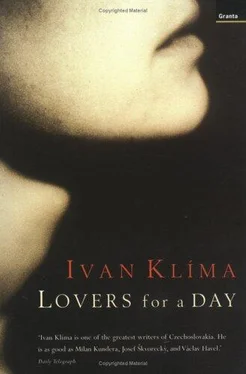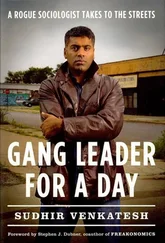'There are increasingly effective drugs around,' the doctor added, 'so don't give up hope.'
'As far as drugs are concerned, I can afford anything, however much it costs.'
'I know that,' said the doctor, 'but it's not a question of money.'
'What is it a question of, then?'
The doctor shrugged. 'Your resistance. The will of God, fate, or whatever you want to call it.'
The operation was arranged for the following week. In the meantime he would have to undergo all the necessary tests.
When Burda came home and his wife asked what the doctor had discovered, he answered laconically, 'I'm going to die.' Then he went to his room, sat down in an armchair and pondered on the strange fact that soon he might not be here any more. Human beings had always struck him as being like machines: machines and human beings wore out with use, but a machine, could be kept going more or less indefinitely by replacing its parts. But how was it with a human being? It seemed so cruel and unjust that a dead machine could be virtually eternal, whereas human components were mostly non-renewable and people were therefore condemned to die before their time. Then he started to worry over what he would do about his property and with his secret bank accounts. When he died everything he owned would go to his wife and children. This seemed to him unjust because none of them had contributed towards the family income. And besides he had given his daughter a car not long ago — and his sons didn't want to know him. It was true that his wife took care of him, but he regularly gave her money for that and paid for her to go skiing in the Alps every winter and every spring. She was bound to have lovers all over the place, in fact he knew about one for sure. He had happened to come upon a letter from the man in
his wife's handbag when he was looking for a bill or something. So why, in addition to all the property and money of his that she would inherit, should his wife get money that she didn't even know existed, just because he had married her?
Then he pondered on the doctor's words about hope and the will of God. To rely on the will of God was as pointless as trusting in fate. The will of God was just something to pacify the weak and the poor, whereas fate did what it was bribed to do. So far he had successfully bribed it and now he shied from the thought of drawing a total blank.
That same afternoon, he climbed into his Mercedes, taking with him his passport and a suitcase, and set off for the border. There was only a hundred thousand francs in his Swiss account, but more in his German one. To the dismay of the teller he asked for it in cash. He returned with the money the next evening and hid the bank notes in a little safe to which he alone had the combination. The following day he went for his first test.
When he was about to go into hospital he was faced with the problem of what to do with the money. The doctor had warned him that he might be in for several weeks. That he might never leave was not mentioned, but the car dealer was all too aware that this possibility could not be ruled out. In fact he might never leave the operating theatre alive. He didn't feel like leaving the money at home, but he could hardly take it to the hospital. Where could he hide it? What would he do with it while he was lying unconscious on the operating table?
Eventually he made up his mind and divided up the hundred-thousand wads into smaller bundles which he stuffed into some old felt slippers and hid them with a pair of rolled socks. Then in his wife's presence he packed the slippers into a
box and sealed it with sticking tape, asking her to bring it to the hospital along with a few other odds and ends, such as ordinary slippers, his toilet bag, two issues of a motoring magazine and his wallet with a few hundred crowns as soon as he asked for them.
He put aside a few thousand marks, sealing them in an envelope for the surgeon. However, the latter made some vague excuse about being superstitious and not 'wanting to hear about money before the operation, and refused to take the envelope from him.
When they opened Burda up on the operating table they discovered that the cancer had not only taken possession of his pancreas, it had also invaded other organs. A radical operation looked so hopeless that they simply sewed him back up again. After two days on the intensive care ward, he was transferred to ward eight which he shared with two other patients. The man to his left was an old blabbermouth from the country who spent most of his time telling trivial stories about his life back home and worrying over the fate of the smallholding that he had left his wife to look after on her own. In the bed to his right was an old man who said nothing and was most likely dying. Now and then, whether awake or asleep, he would produce strange, unintelligible animal-like screeches. These would disturb the car dealer even more than the smallholder's stories, which he simply ignored.
The doctors prescribed a great many drugs and once a day a nurse would bring a stand over to his bedside and hang a bottle from it. She would then insert a needle into one of his veins and he could watch the blood or some colourless liquid flow down the transparent tube and into his body. In spite of it, he felt more and more wretched with each passing day.
His wife brought him all the things he had asked for, adding a bunch of Gerbera and a jar of stewed fruit.
Flowers didn't interest him and he had lost all appetite for food. When his wife left, he opened the box with the slippers, took out the socks and checked that the wads of bank notes were there. He stuffed the socks back in, closed the box and hid it in his bedside table. He was still able to walk, but only to shuffle over to the window or into the corridor before returning to his metal bed. These days he didn't even like leaving the ward. His own death wasn't something he thought about as such, but he couldn't help noticing that his strength was steadily waning. Eventually he would have no strength left at all and he would close his eyes and be incapable of thinking or speaking, let alone taking decisions. What was he going to do with that money?
His wife visited him twice a week and sometimes his married daughter would look in as well. Once his elder son came. They would each bring something he had no use for and he would put it away in his bedside table without interest, and it would either stay there or he would take it and throw it in the waste bin as soon as they had gone.
There were several nurses on the ward. Apart from one older woman, they were hardly more than schoolgirls. They all seemed alike to him and he could only tell them apart by the colour of their hair. They treated him with professional kindness and sometimes would try to joke with him or cheer him up. Before sticking the needle into his vein they would apologize that it was going to hurt a little bit. But then a new nurse appeared — probably just back from leave. She seemed no older than the others, but he was immediately struck by her voice, which reminded him of the long-lost and almost forgotten voice
of his mother. The nurse's name was Věra. He noticed that whenever she came over to him to do some routine job she would always find something to say. And to his surprise, it wasn't just the usual words of comfort, but something about the world outside; about the nice warm day, the jasmine in bloom or the strawberries already ripening on her balcony. He would listen to her, often unaware of what she was actually saying, conscious merely of the colour of her voice and its soothing quality.
One day when he was feeling slightly better after a blood transfusion, he tentatively asked her if she would come and sit by him.
'But Mr Burda,' she said in astonishment, 'what would Matron say if she caught me slacking?' None the less she brought a chair and sat down beside him, taking his hand, punctured with so many injections, and stroking the back of it.
Читать дальше












